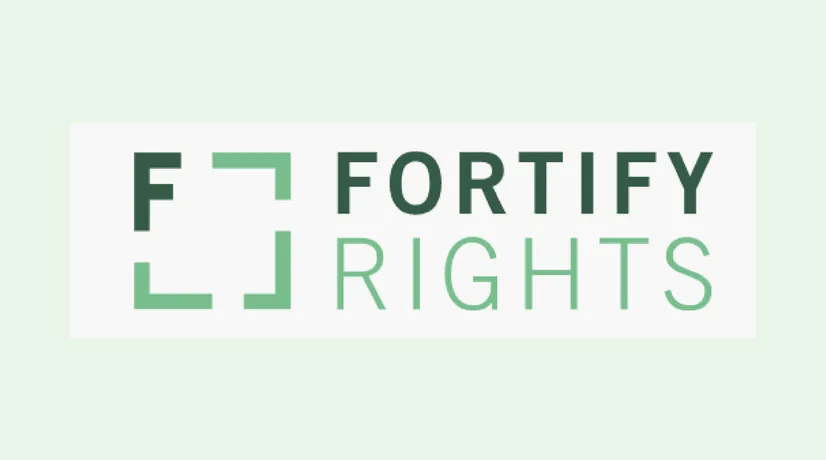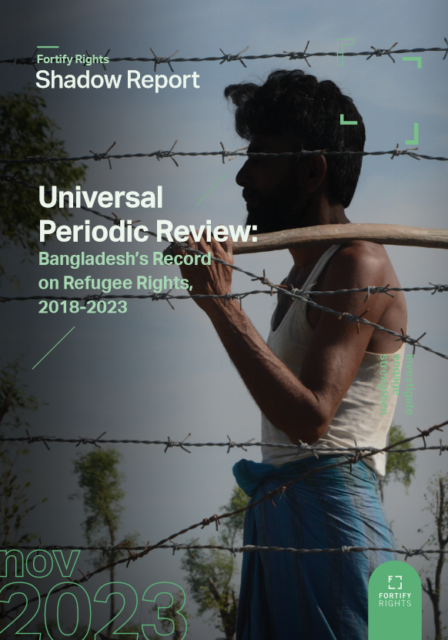Universal Periodic Review: Bangladesh’s Record on Refugee Rights, 2018-2023
09 November 2023


Summary
The Universal Periodic Review (UPR) is a process at the U.N. Human Rights Council through which U.N. member states review the human rights record of all other member states approximately every four years.
On November 13, 2023, the U.N. Human Rights Council, as part of the UPR process, will consider Bangladesh’s human rights record between 2018 and 2023. This “shadow report” is intended to support the UPR process by providing specific information on Bangladesh’s record regarding its treatment of refugees since 2018, with recommendations to improve refugee protections based on Bangladesh’s obligations under international human rights laws and standards. This report focuses specifically on Rohingya refugees in Bangladesh and is based primarily on research and monitoring conducted by Fortify Rights during the period under review.
As of March 2023, there are more than 960,500 Rohingya refugees from Myanmar in camps in Cox’s Bazar District in southern Bangladesh, according to the U.N. High Commissioner for Refugees (UNHCR). A majority of this population fled to Bangladesh in 2016 and 2017 to escape genocidal attacks led by the Myanmar military.
In 2018, during Bangladesh’s last review under the UPR, it received several recommendations relevant to refugees, including recommendations to ratify the 1951 Convention Relating to the Status of Refugees and its 1967 Protocol, ensure access to justice, and abide by the principle of non-refoulement. Bangladesh accepted only one of the nine recommendations specifically relating to refugees—a recommendation made by the Government of Japan to: “Continue to hold constructive dialogue with Myanmar and make efforts to implement the bilateral agreement, aiming at steady and rapid repatriation of refugees.”
In its national report to the Human Rights Council Working Group on the UPR, dated September 1, 2023, Bangladesh provides a brief overview of the history of Rohingya refugees in the country, referring to them not as refugees but as “Forcibly Displaced Myanmar Nationals (FDMNs).” Bangladesh emphasizes that it “remains committed to the FDMNs right to safe, dignified and voluntary
return to their homes in Myanmar” but that a “rigid attitude of the Myanmar regime towards the crisis hinders the resolution thereof through peaceful talks.” The government also notes that through the provision of “temporary shelter” and other services, it has improved the lives of some 32,565 Rohingya refugees on Bhasan Char—an isolated island in the Bay of Bengal.
This UPR shadow report describes violations of Rohingya refugees’ right to freedom of movement, including through the relocation of refugees to Bhasan Char and the construction of barbed-wire fencing to confine refugees within Cox’s Bazar District mainland camps. The fences have prevented Rohingya refugees from escaping deadly fires, impeded humanitarian aid, and caused psychological distress among refugees.
This report also documents how Bangladesh authorities arbitrarily detained and tortured Rohingya refugees and how non-state actors killed and abducted Rohingya human rights defenders and others in the mainland camps with impunity.
The approximately one million Rohingya refugees in Bangladesh have the right to return to their indigenous homeland in Myanmar. However, this report finds that Bangladesh’s attempts to promote the repatriation of Rohingya to Myanmar are premature and dangerous.
Lastly, Rohingya survivors of genocide, crimes against humanity, and war crimes have a right to remedy for crimes committed against them. The right to remedy in this context includes the rights of victims and survivors to seek justice, accountability, and redress for the harms they have suffered in Myanmar. This report finds that the Government of Bangladesh is meeting its obligations to ensure international justice and accountability for Rohingya people. This report also includes 15 recommendations for the Government of Bangladesh that States reviewing Bangladesh’s human rights record under the UPR process can and should echo.
Announcements
21 May 2025
Open letter: Malaysia must lead ASEAN with principle, not hypocrisy, to address the Myanmar crisis

Progressive Voice is a participatory rights-based policy research and advocacy organization rooted in civil society, that maintains strong networks and relationships with grassroots organizations and community-based organizations throughout Myanmar. It acts as a bridge to the international community and international policymakers by amplifying voices from the ground, and advocating for a rights-based policy narrative.